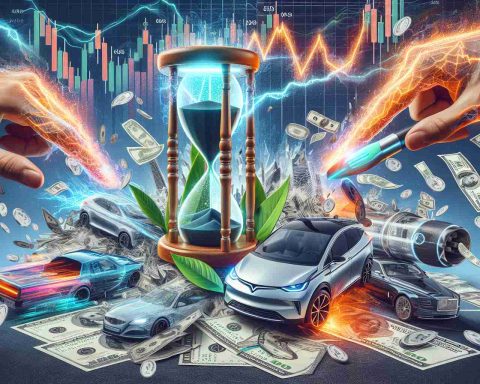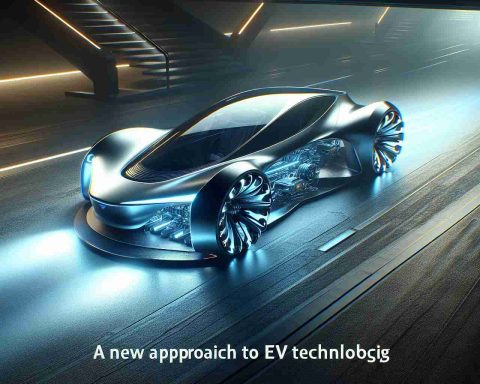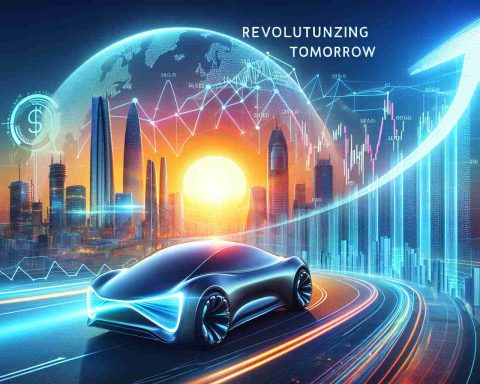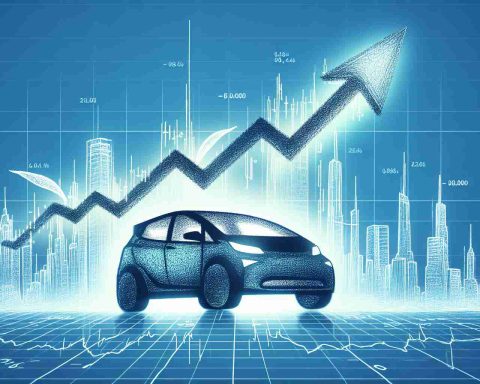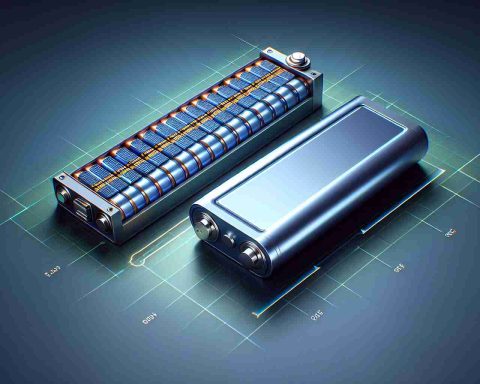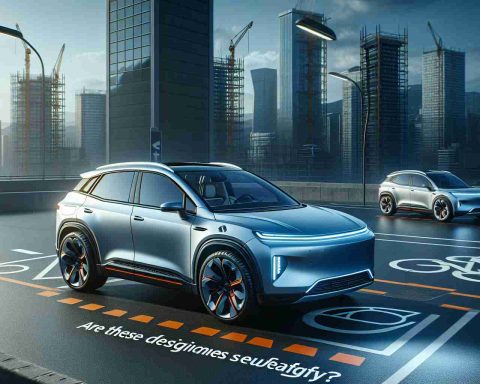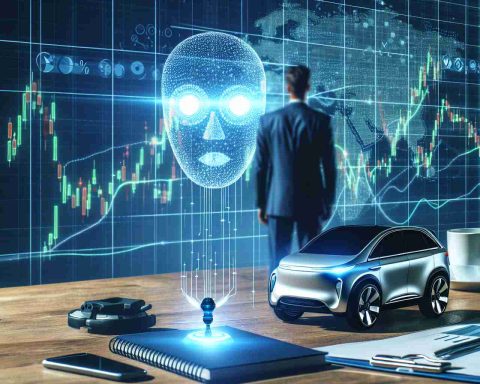As electric vehicle (EV) manufacturers prepare for the Bharat Mobility Global Expo in New Delhi, the competitive landscape of India’s rapidly expanding automobile market is heating up. Notably absent from this burgeoning scene is Tesla Inc., which has yet to make its move in a market that many consider vital for the future of EVs.
This week’s event will feature major players like Maruti Suzuki, which aims to make a significant impact with the introduction of its e-Vitara SUV, developed in partnership with Toyota. Other key participants include VinFast, showcasing its VF7 and VF9 models, and BYD, which will expand its current lineup alongside established names like Hyundai and Tata Motors.
India, the world’s third-largest greenhouse gas emitter, is diligently pursuing a path to net-zero emissions by 2070. The emergence of more EV options aligns with government efforts to decarbonize the economy and combat severe air pollution, particularly in major urban areas where road transport contributes significantly to the problem. Currently, EVs represent only 2.4% of the over 4 million vehicles sold in India last year, highlighting the potential for growth.
The absence of Tesla, a market leader in EVs, has sparked speculation regarding its future in India, particularly amidst ongoing discussions about high import tariffs. Although Tesla’s CEO Elon Musk has shown interest in entering the market, significant barriers remain. Meanwhile, local automakers are seizing the opportunity to enhance their foothold, with Maruti Suzuki poised to leverage its extensive market knowledge.
As competition intensifies, the entry of more electric models could significantly accelerate EV adoption in India, creating a vibrant landscape for consumers and manufacturers alike.
The Future of Electric Vehicles in India: Implications for Society and the Global Economy
The presence of leading electric vehicle (EV) manufacturers at events like the Bharat Mobility Global Expo signals a pivotal moment for India’s automobile market. As domestic and international players navigate this rapidly evolving landscape, the implications for society, culture, and the global economy become increasingly pronounced.
Societal Impact and Cultural Shifts
The growing adoption of EVs has the potential to transform Indian society, particularly in urban centers plagued by severe air pollution. As the government aims for net-zero emissions, the shift toward cleaner transportation not only curbs greenhouse gas emissions but also tackles health-related issues stemming from air quality. An increase in EV usage can lead to cleaner air and improved public health outcomes, fostering a cultural shift towards sustainability and environmental responsibility.
Moreover, with more electric options emerging, consumers are likely to become more environmentally conscious, prompting a broader societal shift that values sustainable practices. This can influence consumer behavior beyond automobiles, encouraging a holistic embrace of green technologies and lifestyles.
Economic Consequences and Global Trends
The potential economic impact of a thriving EV market in India cannot be overstated. As local manufacturers ramp up production, this industry could serve as a catalyst for job creation in manufacturing, infrastructure development, and technology sectors. The burgeoning EV market may also attract foreign investment, as global companies look to capitalize on India’s large consumer base and the government’s favorable policies for EV production and adoption.
On the global stage, the success of India’s EV market may set a precedent for other developing economies grappling with similar environmental challenges. With nations looking to shift gears in their battle against climate change, India’s approach to integrating electric vehicles could offer a blueprint for sustainable growth that balances economic development and ecological responsibility.
Environmental Implications and Future Trends
The environmental ramifications of a widespread transition to electric vehicles are significant. As major urban areas transition to EVs, reductions in particulate matter and nitrogen oxides from traditional combustion engines could lead to substantial improvements in air quality. This shift is critical, especially in cities where transportation is a primary source of pollution.
Future trends indicate that as battery technology improves, the range and charging times of EVs will enhance their appeal. The expansion of charging infrastructure will also play a crucial role in alleviating range anxiety among potential EV users. As manufacturers like Maruti Suzuki and BYD introduce more models, competition will likely drive innovation and reduce costs, making EVs more accessible to the average consumer.
Long-Term Significance
Looking ahead, the long-term significance of this burgeoning EV market in India could redefine not only the economic landscape but also the cultural ethos surrounding transportation. The increasing presence of EVs represents more than just an automotive trend; it is a mirror reflecting society’s aspirations for cleaner energy, healthier cities, and sustainable living.
In conclusion, the dynamics of the Indian EV market are reshaping societal norms, providing economic opportunities, and setting environmental benchmarks. As the sector evolves, its implications will resonate beyond India, influencing global automotive trends and sustainability efforts worldwide.
Exploring EV Adoption in India: Insights and Implications
As India’s electric vehicle (EV) market continues to evolve, understanding the nuances of this transformation becomes crucial for consumers, manufacturers, and policymakers alike. With key players gearing up for the Bharat Mobility Global Expo, a spotlight illuminates the critical factors influencing EV adoption within the country.
FAQs about EV Adoption in India
Q1: What are the current challenges for EV adoption in India?
A1: Major challenges include high vehicle costs, limited charging infrastructure, and consumer skepticism regarding battery life and maintenance. Additionally, the relatively low market share of EVs reflects a resistance towards transitioning from traditional combustion engines.
Q2: How is the Indian government supporting the EV sector?
A2: The government has introduced incentives such as the Faster Adoption and Manufacturing of Electric Vehicles (FAME) scheme, which offers subsidies and tax benefits to encourage both manufacturers and buyers to invest in electric technologies.
Q3: What can consumers expect in terms of EV options in the near future?
A3: Consumers can anticipate a wider array of models at various price points as manufacturers like Maruti Suzuki, BYD, and VinFast introduce new offerings. This diversity aims to cater to different consumer needs and preferences, fostering a more competitive environment.
Pros and Cons of Electric Vehicles in India
Pros:
1. Environmental Benefits: EVs contribute significantly to reducing greenhouse gas emissions, playing a vital role in India’s commitment to achieving net-zero emissions by 2070.
2. Economic Growth: As local manufacturers ramp up production, the EV sector has the potential to create numerous jobs across the supply chain from manufacturing to sales.
3. Reduced Pollution: With reduced air pollutants from vehicles, urban areas can experience significant improvements in air quality, enhancing public health.
Cons:
1. Infrastructure Limitations: The absence of widespread and reliable charging stations remains a barrier, limiting long-distance travel and convenience for potential EV owners.
2. Initial Costs: While operational costs for EVs tend to be lower, the initial purchase price can still be a significant deterrent for many Indian consumers.
3. Battery Concerns: Issues related to battery disposal and longevity may lead to environmental challenges if not addressed through proper recycling and technology advancements.
Future Trends and Predictions
As EV adoption in India accelerates, several predictions emerge for the near future. First, technological advancements, particularly in battery technology, are expected to drive down costs and increase the range of electric vehicles. Moreover, as more local and international players enter the market, competition is likely to spur innovation and improve offerings, pushing prices down further.
In terms of infrastructure, a concerted effort from both the government and private sectors to expand charging networks could alleviate one of the most pressing barriers to adoption. Collaborations among private firms may lead to innovative charging solutions, such as ultrafast charging stations and battery-swapping systems.
Related Insights
According to a report by the Indian Electric Vehicle Market Outlook for 2023, the market is projected to grow at a compound annual growth rate (CAGR) of 40% over the next five years. This growth signifies the increasing recognition of EVs as a viable and necessary alternative to traditional vehicles.
In conclusion, as key players prepare to unveil their latest innovations at events like the Bharat Mobility Global Expo, their successes, along with government support and consumer acceptance, will shape the evolving narrative of electric vehicles in India. For those interested in further details about India’s EV landscape, visit Electric Vehicle Info.








